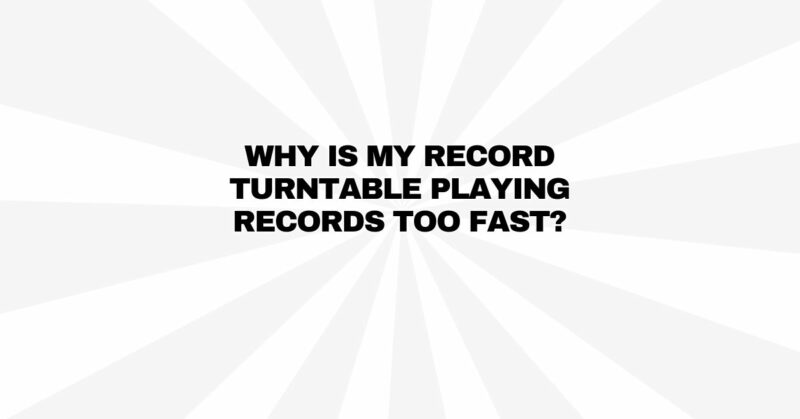Vinyl records have a timeless charm, known for their warm, analog sound that draws audiophiles and music enthusiasts alike. However, if your turntable is playing your records too fast, it can be a frustrating and perplexing issue. In this detailed guide, we will explore the potential causes behind your turntable’s speed problem, troubleshooting steps you can take, and how to resolve the issue to enjoy your vinyl collection at the correct playback speed.
Understanding Playback Speed:
Before diving into the reasons why your turntable may be playing records too fast, it’s essential to grasp the fundamentals of playback speed for vinyl records:
- Standard Speeds: Most vinyl records are designed to be played at one of two standard speeds: 33 1/3 revolutions per minute (RPM) for LPs (long-playing records) and 45 RPM for singles or smaller records. These speeds are critical for maintaining pitch and sound quality.
- Turntable Components: The correct playback speed is achieved through the turntable’s motor and a belt or direct-drive mechanism, which rotates the platter at the specified RPM.
Common Causes of Too-Fast Playback:
When your turntable plays records too fast, it can be attributed to several factors. Here are some common causes:
- Incorrect Speed Setting: One of the most common reasons for fast playback is an incorrect speed setting. Turntables typically have a switch or button to select between 33 RPM and 45 RPM. If it’s set to the wrong speed, your records will play too fast or too slow.
- Belt Drive Issues: Belt-driven turntables rely on a rubber belt to connect the motor and the platter. If the belt is loose or slipping, it can cause speed fluctuations and result in fast playback.
- Motor Problems: Problems with the turntable’s motor, such as a malfunctioning motor or incorrect voltage supply, can lead to irregular playback speed.
- Pitch Control Adjustment: Some turntables have a pitch control adjustment that allows you to fine-tune the playback speed. If this control is accidentally adjusted, it can affect the speed.
- Strobe Light Calibration: Turntables with a built-in strobe light may require calibration. If the strobe is not aligned correctly, it can create an illusion of incorrect speed.
- Electronic Speed Control Issues: Direct-drive turntables with electronic speed control may experience problems with the speed circuitry, causing speed irregularities.
Troubleshooting and Resolving the Issue:
If your turntable is playing records too fast, follow these troubleshooting steps to identify and resolve the issue:
- Check the Speed Setting: Ensure that your turntable’s speed setting is correctly adjusted to either 33 RPM or 45 RPM, depending on the record you are playing.
- Inspect the Belt: If you have a belt-driven turntable, inspect the belt for signs of wear, damage, or slipping. Replace the belt if necessary, following your turntable’s manufacturer guidelines.
- Motor and Power Supply: Check the turntable’s motor for any visible issues or loose connections. Ensure that the turntable is receiving the correct voltage supply. Consult the manufacturer’s manual for guidance.
- Pitch Control and Strobe Calibration: If your turntable has pitch control or a strobe light, carefully recalibrate or reset them to the correct settings as per the manufacturer’s instructions.
- Electronics and Speed Control: If you have a direct-drive turntable with electronic speed control, consider seeking professional assistance for diagnosing and repairing any electronic issues.
- Professional Servicing: If troubleshooting steps do not resolve the issue or if you are uncomfortable performing repairs, it’s advisable to consult a professional turntable technician or service center for a thorough assessment and repair.
Conclusion:
A turntable playing records too fast can be a frustrating experience, but it is typically a solvable issue. By carefully inspecting and troubleshooting the various components of your turntable, you can identify the root cause and take appropriate steps to correct the speed problem. Once resolved, you can enjoy your vinyl collection at the correct playback speed, immersing yourself in the rich, analog sound that makes vinyl records so cherished by music enthusiasts.


